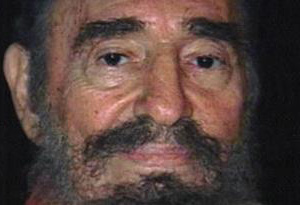 |
 |
 |
 Editorials | February 2007 Editorials | February 2007  
A Cuba Without Fidel
 Joey Kennedy - Birmingham News Joey Kennedy - Birmingham News


| | "The problem of the United States is Fidel Castro. When Fidel is gone, what is the problem going to be?" |
Those who want to know what Cuba will be like after longtime president and dictator Fidel Castro is gone should simply visit the island-nation today.

Of course, with the strict travel restrictions placed on U.S. citizens by the Bush administration and the U.S. economic embargo, only journalists, diplomats and certain professional delegations are allowed to enter the country without a special license from the U.S. Department of Treasury.

Even with that failed embargo, it is apparent that the Cuban people already are in transition to a post-Castro Cuba. Some of the signs are obvious. Before he became ill last summer with an intestinal disease believed to be diverticulitis, Castro's likeness was rarely seen on the signs and billboards touting socialism and the revolution that dot the city and countryside. Now, Castro's words and picture are becoming as common as those of revolutionary heroes Che Guevera and Jose Marti. Shops offer a wide variety of Castro postcards, books and mementos, also uncommon before his current infirmity.

When he fell ill, Castro himself told the Cuban people to prepare for his death, and El Jefe began orchestrating a transition in government power that appears now, more than six months later, firmly entrenched. Fidel Castro, 80 years old, named his brother, Raul Castro, 76, his successor, but also appointed five other top officials to share responsibility for everything from foreign affairs to health care.

"These guys know what they are doing. They are prepared to lead Cuba without Fidel," said Marifeli Perez-Stable of the Washington think tank Inter-American Dialogue in a recent Associated Press interview. "The country, in the short run, is not going to collapse."

That sentiment is reflected by ordinary Cubans, too. The world and, especially, U.S. citizens, shouldn't expect the Cuban people to take to the streets when Castro finally dies, said a government worker at Havana's sprawling harbor.

"We're not interested in protests or strikes," he said. "I don't think the Cuban people want to do what Fidel's generation did."

The harbor worker has a point. The great majority of Cubans today know life only under Fidel Castro. They're happy with the nation's health care system (free care, with life expectancy equal to that in the United States; the infant death rate in Cuba actually is lower). Cubans are guaranteed an education (the literacy rate is 98 percent). The economy, despite the embargo, is growing. Oil from Venezuela, vehicles and appliances from China and elsewhere, and food from Vietnam, Canada and other nations, are flowing into the country. Tourism and cultural exchanges from most everywhere but the United States are increasing; foreign investment is being solicited by the Cuban government.

"People know Fidel is dying," the harbor worker said, "and the government is in a critical situation. But the people don't want to create any problems. They don't want to risk their lives. Things are improving."

Julia E. Sweig, an expert on Cuba and director of Latin America Studies at the Council on Foreign Relations, argues in an essay in the current issue of "Foreign Affairs" magazine that Castro's reign actually ended last summer when he transferred authority to his brother and the other loyalists. The transition, writes Sweig, has been "notably smooth and stable. Not one violent episode in Cuban streets. No massive exodus of refugees. ... Within Cuba, whether Fidel himself survives for weeks, months or years is now, in many ways, beside the point."

A general practice physician who recently returned to Cuba from Venezuela where he was posted for three years, agrees that Fidel's eventual passing will do little to change everyday Cuban society.

"Yes, he's old and sick, and so what?" said the doctor. "Fidel has finished his career as president."

While the doctor admits that Cuban workers still must find a way to supplement their meager government incomes (equivalent to about $25 a month) to make ends meet, "you have to see the good things the government does for people, too. No government is perfect."

The Cuban government has sent thousands of doctors, social workers, engineers, scientists and others abroad to help in developing nations. In all, Cubans are posted to 69 different countries today, and Cuba has normal diplomatic relations with 160 nations, according to Sweig in "Foreign Affairs."

"We have many things to show the world," said the doctor. Likewise, he said Cuba will "never close the door for people who want to help us, nor do we close the door for people who ask for help."

The smooth transition in power from Fidel Castro to Raul Castro and the other Castro loyalists likely caught officials with the Bush administration off guard. Just as in Iraq, where top U.S. officials predicted the Iraqi people would welcome Saddam Hussein's removal and turn toward democracy practically overnight, so, too, are they betting Cubans will demand radical changes in the government after Fidel Castro's death.

That's not likely to happen. It is believed that Raul Castro will move Cuba more toward China's model of a state-dominated market economy, but don't expect a whole lot of drama, even after Fidel Castro dies.

"We want to improve our lives, our houses, our families; to have fun," said the harbor worker. "We don't want trouble."

The physician agrees. "The problem of the United States is Fidel Castro," he said. "When Fidel is gone, what is the problem going to be?"

Joey Kennedy, a Pulitzer Prize winner, is an editorial writer and editor of the Sunday Commentary section for The News. He has traveled to Cuba six times. Email: jkennedy@bhamnews.com. | 
 | |
 |



